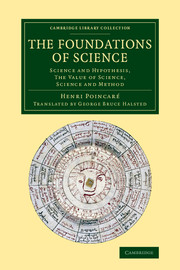
-
Select format
-
- Publisher:
- Cambridge University Press
- Publication date:
- June 2015
- December 2014
- ISBN:
- 9781107252950
- 9781108069496
- Dimensions:
- Weight & Pages:
- Dimensions:
- (234 x 156 mm)
- Weight & Pages:
- 0.87kg, 570 Pages
You may already have access via personal or institutional login
Book description
A member of the Académie française, Henri Poincaré (1854–1912) was one of the greatest mathematicians and theoretical physicists of the late nineteenth and early twentieth centuries. His discovery of chaotic motion laid the foundations of modern chaos theory, and he was acknowledged by Einstein as a key contributor in the field of special relativity. He earned his enduring reputation as a philosopher of mathematics and science with this elegantly written work, which was first published in French as three separate essays: Science and Hypothesis (1902), The Value of Science (1905), and Science and Method (1908). Poincaré asserts that much scientific work is a matter of convention, and that intuition and prediction play key roles. George Halsted's authorised 1913 English translation retains Poincaré's lucid prose style, presenting complex ideas for both professional scientists and those readers interested in the history of mathematics and the philosophy of science.
Contents
Metrics
Full text views
Full text views help Loading metrics...
Loading metrics...
* Views captured on Cambridge Core between #date#. This data will be updated every 24 hours.
Usage data cannot currently be displayed.
Accessibility standard: Unknown
Why this information is here
This section outlines the accessibility features of this content - including support for screen readers, full keyboard navigation and high-contrast display options. This may not be relevant for you.
Accessibility Information
Accessibility compliance for the PDF of this book is currently unknown and may be updated in the future.


